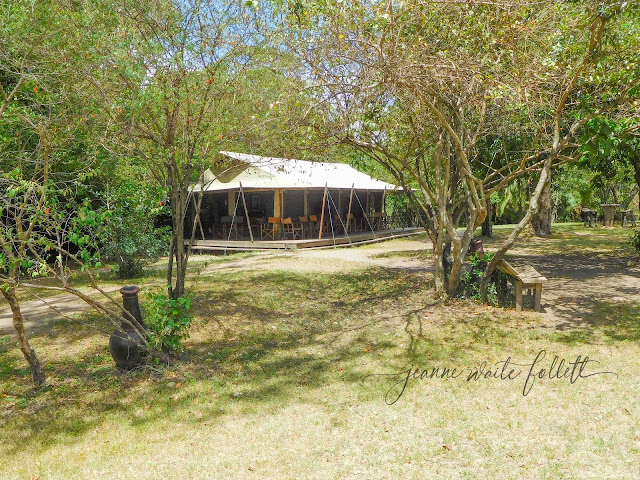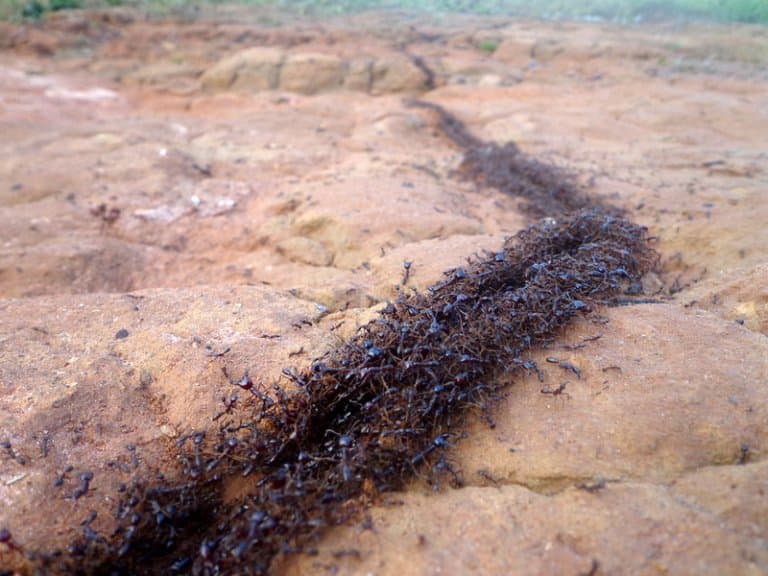(Note: To view photos in a larger format, click on one. A film strip will open at the bottom of the page and you can click through them there.)
Chapter 27:
Leaving our Home away from Home
It’s moving day and we have a long drive to make. After six nights at Enkewa camp, our home away from home, we are heading north to meet up with the drivers from Great Plains Expedition camp, our fourth and final camp of this safari.
 |
| I will also miss the wonderful food at Enkewa. |
I’m not at all ready to leave. Oh, my luggage is packed and waiting by the front flap of the tent—inside so the vervets don’t mess with it. I simply love this camp and its staff and don’t want to leave. Its relative isolation provides us with many wildlife sighting with few, if any, other safari vehicles around.
However, off we go at the appointed time. Marg, Virginia, and I are in Dominick’s truck.
Our first sighting is a lion have breakfast, although from the condition of the wildebeest carcass, I think he might be having fourths or fifths.
He walks away, and a lioness approaches for her multiple serving. Both of their bellies are huge, indicating they have been eating for a while.
And, yes, the rumors are true. The males will eat first even though the females might have brought down the animal. If the males aren't around, the adult females are first, and then the cubs.
Lions are very social and affectionate with each other, though a male might growl at little cubs climbing all over him. They make a number of vocalizations to communicate. The loudest, of course, is the roar which can be heard, they say, up to five miles away.
The roar is usually made to locate another lion in the pride. Contrary to the song about the lion sleeping in the jungle, lions prefer the savannah grasslands. They spend most of their days lolling about and sleeping. Most hunting tends to occur at night, though there are exceptions.
Then we find Luluka, the leopard who has two cubs tucked away somewhere. She has a small antelope down and is moving it.

She is soon surrounded by safari vehicles. The trucks are supposed to stay on the established trails unless the occupants have purchased an off road permit. Some of the vehicles on the right mat or may not have the permit, which must be displayed on the vehicle.
 |
| Luluka is to the right of the tree. Just a little spot. |
We watch Luluka for a long time, hoping she will carry the carcass up into the small tree.
Then, as we have a timeline to follow, we’re off and moving again.
Eventually, we stop for breakfast.
 |
| Under the shade tree. |
 |
| L-R: One Ten, Virginia, Sylvia, Peter, Marg, me, Ben, Pere, Shelly is hiding in the back, Cory, Randy, and Johnson. |
 |
| Dominick |
 |
| There was a lot more to start with. |
Still heading north, we meet the Great Plains guys and transfer into different vehicles. Frank is driving and Alex is the spotter.
It’s overcast and raining lightly for most of the trip.
These are the sightings during the journey to camp:
 |
| Lark |
 |
| Gray-headed kingfisher |
 |
| A fig tree with its roots exposed by erosion. |
 |
| Little bee-eater. |
 |
| Female agama lizard. |
 |
| Safari ant trail. |
 |
| NOT MY PHOTO. |
 |
| Spurwing lapwing on a nest. |
 |
| Blue-eared starling. |
 |
| Topi with her calf. I love the hair patterns inside their ears. |
 |
| Two topi calves. The one on the left is starting to grow horns. |
 |
| Warthogs and a Thompsons gazelle. |
 |
| This bird is called a water thick-knee. Look at the huge eyes. |
Great Plains Expedition camp is lovely. It’s located on a parcel of privately-owned land, surrounded on one side by the Maasai Mara, the private conservancy Naboisho, and another conservancy called Olare Motorola, or OMG for short.
 |
| Remembered to take a photo before I messed it up. |
 |
| Where all the photo-editing gets done, batteries charged, etc. |
 |
| The main dining room and lounge tent. We occasionally had lunch on the deck. |
And a zebra joined us for entertainment. Expedition camp is fenced, but only to keep out the elephants that can be so destructive. Anything else can wander through the front gate if it can fit under the overhead cross bar.
After lunch, we were treated to a wee bit of rain (she says facetiously).
 |
| This jackal is gobbling the termites that came up from the wet ground. |
 |
| Hadada birds. |
To top off the day, we visited a hyena den to see the pups. Hyena pups have black hair that slowly turns to the usual black-spotted ginger color.
Bed time. It was a long, thoroughly enjoyable day.


















We can well imagine it was a "tug" leaving your Home Away From Home, perhaps also in knowing your next camp would be your last for this journey. However, it seems like you certainly saw a lot on your trip to the next camp. The "shade tree" for your breakfast did not seem to be casting much shade. Chuckle. Speaking of breakfast, they certainly feed you well there!! Nice group photo. The Safari Ant Trail is impressive, and a colony can have up to 50 million ants. Whew! Always fun to see calves and pups. It always makes our day to see a new post from you Gullible!! Smiles, Patti and Cap
ReplyDeleteI had to giggle when I read your comment to photo 28 (Remembered to take a photo before I messed it up). That is a "me too" observation. When we go into a motel, hotel or other room, seldom do I remember to do a photo shoot before we dump all of our stuff all over the place! Photo 37 and others, we both love the "cubs" and youngsters. The very young are so very sweet. Why can't you just stay over there for a few months. "Hire on" as a guide or something. I know, I understand that it simply would not "fit" for you to do so. Smiles.. Cap and Patti
DeleteWould I love to stay a few months? You bet. But it would be beyond my means. Hire on? Nope. Guides go through extensive schooling and testing. I could wash dishes, but then I'd be taking a job away from an African. Plus, if I worked, I'd never be in the field.
DeletePatti, there is always a "tug" when leaving any camp because we enjoy it so much and there is some trepidation about the next camp. I have never stayed in a camp that I would not want to go back to. It's always a joy to see comments from you two, and always very appreciated.
Delete